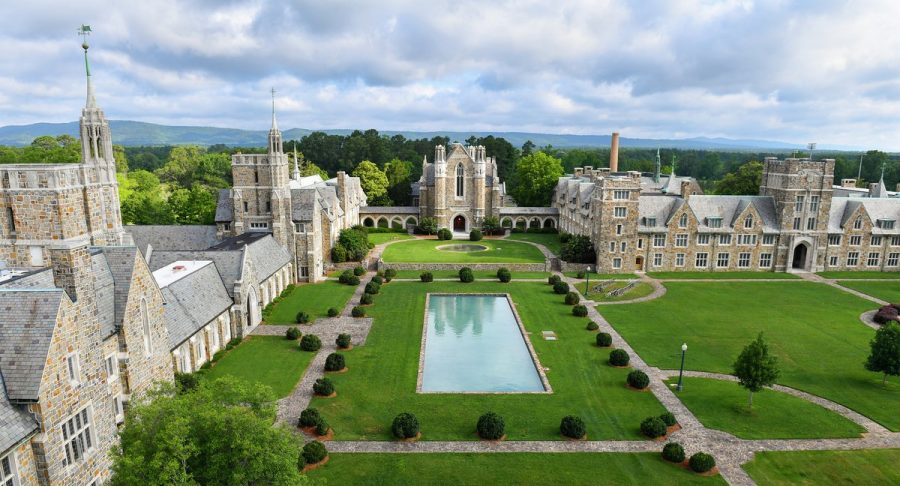Governor’s Honors Program offers students a unique and rewarding opportunity
St. Pius X will send 7 students to the program this summer at Berry College
May 16, 2022
For 59 years, Georgia’s best and brightest have gathered on various college campuses over the summer to participate in the Georgia Governor’s Honors Program (GHP). St. Pius X sends a handful of students to the program each year who exhibit academic excellence and a passion for learning, but very few people know what the process is like. Click here to see a complete list of this year’s attendees.
Nomination Process
It starts with a teacher nominating a student to an area of study or a “major.” Juniors Omeno Abutu and Gracie Crofton were nominated for French this year, and they are two of the seven students attending GHP from St. Pius. Accepting the nomination should be considered heavily as the application process alone requires a huge commitment.
“I accepted the nomination because I want the opportunity to be able to go over the summer and further something that I’m already so passionate about with people who also feel the same, not only with French but also in general with a bunch of people passionate in so many other fields,” said Abutu.
“My friend Gracie Rosenberg went to GHP last year and made some close friends, and I hope to do the same if I make it, though that’s a secondary reason,” said Crofton.
The nominees often seek information and advice from GHP alumni, as the process is still fresh in their minds from the previous year. Other mentor figures for nominees are the teachers who devote their time to preparing their nominees for the interview rounds starting with the St. Pius interview.
“At first I was a little nervous because I didn’t know what to expect,” Abutu said, “but when I got into the room and it was people that I had known before and the heads of the departments, many of whom had taught me, I felt more comfortable.”
Taking place in early fall, the first round is the most simple. It consists of a panel of about 10 teachers, mostly department heads and other teachers of prominence, and in five to ten minutes, their goal is to determine if the nominee is passionate about and involved in their area of nomination. It’s a more casual, conversational interview, and it does not require you to prove yourself with skills from their areas of nomination.
Once official school nominees are announced, the second round of interviews begin. This is done online at the state level through the Governor’s Honors Program. With questions designed to demonstrate your proficiency in your major and your overall academic interests, this round is much more detailed and time consuming than the previous one.
“We had a few essays, so the first one was to choose a cultural or historic aspect of French that really inspired us. I chose music and French music. Even if you don’t know all their lyrics or understand what they’re saying, there’s an underlying message you can receive,” said Abutu.
“My second essay was talking about just extracurriculars and how you incorporate French into your life outside of school.”
Here, nominees have the most control over their answers as they can dedicate two whole months to completing the required fields ranging from short answer questions to videos to teacher recommendations. It is important to stand out in this round because of how many students are being considered. 3,200 students are nominated each year, but only 20% actually attend.
“I was stressed out about all of it, especially since I find speaking parts to be incredibly nerve-wracking, whether they be in English or in French,” said Crofton.
The semi-finalists are announced in January, and they are given a month to prepare for in-person interviews at Berry College in Rome, Georgia.
“Omeno Abutu and I practiced with Madame Stockard a few days before the interview, and I think that helped. I also studied verbs that I was rusty on and words I thought I might need to make sure my vocabulary was up to snuff,” said Crofton.
This is by far the most intimidating round, but the beauty of the largest college campus in the world tends to sooth the anxious nominees. This is also where the program is held over the summer, so it is a nice way for students to familiarize themselves with it beforehand.
“It was definitely different from what I’m used to here at Pius. It’s also expansive with lots of nature. I felt like maybe it would be something I could get used to because even though it was big it felt kind of homey in a sense, and they were very welcoming,” said Abutu.
The interviews are grouped together by major and staggered throughout one typically cold Saturday morning during the end of February.
“We met all in like a hall, and they called us up. Then we were brought into a room specifically for French where there were two people there who interviewed us, and they asked us questions in French. One of them was picture identification and making up a narrative based on the picture,” said Omeno. “The third round was writing and we had a whole list of prompts that we could choose from, so it was good because we had a whole bunch of different options and you could write according to your proficiency in French.”
Each interview is vastly different. The musical majors perform pieces, the art majors present portfolios, the math and science majors discuss theories, the English majors analyze passages, the social studies majors hold debates, and other language majors are similar to French.
“The other interviewees in my time slot were very friendly and helped to calm my nerves a little, but I still got quite nervous,” Crofton.
The interviewees remain anonymous, but they are typically from your area of study which makes them incredibly qualified to assess your proficiency. This round is free from any holistic aspects and focuses on academic skill, and everyone involved tries to make the process as stress-free and casual as possible.
After a long car ride home, all nominees can do is wait another month until final decisions are released where they find out if they’ve been accepted, denied, or waitlisted.
Program
Once accepted, students begin a whole new (and less stressful) phase of preparation for an entire month away from home over the summer. Many say it’s like preparing for college on a much smaller scale.
“It was mostly just going to Costco, making a list, and stocking my room with snacks. I was just trying to make sure I didn’t forget anything,” said seniorGracie Rosenberg, who participated in the program as a theater major last summer.
The program begins in mid-June and lasts until mid-July. After a long drive up to Rome, Georgia, Berry College welcomes all the students and streamlines them through registration. For the first few hours, students and parents are directed all over campus to get their ids, check into their dorms, and eat lunch in the dining hall.
“When I first showed up there, I really liked the feel of the campus. It’s one of the largest campuses in the world, and the way everything looked made me excited for a good summer,” said senior Jake Fleming, who was a math major in the program last summer.
GHP has full access to almost everything Berry has to offer from the library to the hiking trails, so students get to know the campus well, especially during the first couple days. Through many orientation-style events, students also get to know each other.
“My friends were all over the place. A lot of the guys were STEM majors, some sort of science or math, and most of us met just in our hall, but then we started to meet more people and became friends with English majors and music majors. It was just based on who you met in the first couple of days,” said Fleming.
Every major structures class differently, but for everyone class is four hours long from Monday to Saturday. This seems long and boring, but GHP teachers keep students engaged with material most kids have never explored like game theory or with demonstrations like a modern take on the French Revolution.
“For theater we had two classes per day, and we picked new ones at the beginning of each week. One class was always with a guest artist so one week we had puppetry then we had carpentry or directing, and it was just a lot of fun,” said Rosenberg.
It’s important to remember that students choose GHP because of their passion for their major, so most of them love spending the whole morning in class.
“For math we had three classes each because there were about 80 of us. We picked our three and you had them every day but in a shifting rotation so it wouldn’t be the same order every day,” said Fleming.
After a brief break for lunch, students gather together for minors. This is an opportunity to explore the other areas of study at GHP, and students are actually encouraged to choose something entirely different from their major. These classes only last for two hours in the afternoon Monday through Friday.
“I minored in steel pan drums, and I was one of 12 lucky people who got in. That was a lot of fun getting to walk over to the music building that looks like it was ripped out of Hogwarts,” said Rosenberg.
Once minor classes end, students are free for the evening to roam the campus and hang out with friends until lights out.
“With whatever time we had left in the day we would go to seminars, like on Friday we always went stargazing. One of the girls’ dorms had this huge glass seating area that overlooked this huge grassy meadow, so everyone brought blankets and music and we all just hung out there until we had to go inside for lights out,” said Rosenberg.
Resident Assistants, many of whom are GHP alumni, not only manage dorm halls but they also hold seminars. The topics range from mafia games to book clubs, so there is something for everyone. These quick, optional events are great ways for students to meet new people or get closer with their friends. Additionally, some students take the liberty of organizing little groups themselves.
“I met a group of people through my hallmates, and we met on Sundays to play D&D,” said Rosenberg.
Students also hold movie nights in their dorms, attend weekly dances, form beach volleyball teams, and go to the gym together. With so many activities and so much free-time to balance with their classes, students got a mock-college experience.
“My biggest takeaway is probably just that I’m so excited for college and to live life on my own and meet new people from all over the place,” said Fleming.
What makes GHP so unique is that it gathers students from across Georgia with many different backgrounds. Each student brings their own experiences and skill sets that enrich the program, and this all is put on display through final projects, concerts, exhibitions, and more for everyone to enjoy.
“Take advantage of everything you can do during that month because a month does seem like a long time, but once you’re there it really flies so make the most of everything you have available to you,” said Rosenberg.
GHP presents students with a wide variety of opportunities to excel not only within the major but in all areas of study, but it is up to the students to take initiative and participate. While this much freedom may seem daunting, students find that they quickly adjust after a few days.
“Don’t be scared about it because as soon as you get there, you start to realize how great of a community it is there and everyone just welcomes you. No one really cares who you are or what you did. Everyone is there because they are passionate about the major they applied for, so once you get into that environment it becomes a great place to thrive,” said Flemming.
The program ends with final celebrations and lots of tears as students part after a fun month together. The lessons learned and connections made at GHP are incomparable to any other high school program, and that kind of bond lasts a lifetime. Many recent alumni are preparing to travel miles across the state to attend their GHP friends’ graduation parties, while older alumni are making connections for their friends in the corporate world. GHP is the kind of experience that remains with you for a lifetime, so to any students still considering it, those who have done it before encourage you to just take the leap. You won’t regret it.






